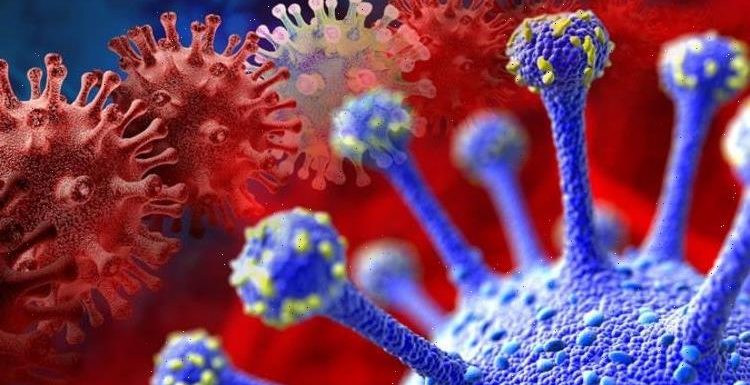
Omicron variant: Epidemiologist explains why we need third jab
We use your sign-up to provide content in ways you’ve consented to and to improve our understanding of you. This may include adverts from us and 3rd parties based on our understanding. You can unsubscribe at any time. More info
The new technology uses a jet of air to push through the skin, as opposed to the conventional needle. It has been developed by the University of Southampton.
Whereas most existing Covid vaccines use the RNA from samples of the initial virus that were sequenced at the outset of the pandemic in January last year, the DIOSvax technology used for the new vaccine hopes to predict how the virus could mutate in the future.
This would allow it to target emerging variants as they arise.
Saul Faust, clinical chief investigator and director of the NIHR Southampton Clinical Research Facility, said: “This isn’t simply ‘yet another’ coronavirus vaccine, as it has both Covid-19 variants and future coronaviruses in its sights.
“This technology could give wide-ranging protection to huge numbers of people worldwide.”

Messenger RNA vaccines – such as the Pfizer or Moderna COVID-19 vaccines – use lab-created mRNA to teach cells how to make a protein that mimics the protein coronavirus causes cells to make when infected.
This triggers an immune response in the body, which produces antibodies designed to protect against the coronavirus the vaccine mimics.
That means, if a vaccinated person is infected with the coronavirus, it already has the antibodies designed specifically to fight it.
However, emerging variants such as the Omicron variant have some mutations in the spike protein, which it uses to latch on to cells.


This means when the virus takes over a cell and uses it to begin producing new virus particles, including spike proteins, those proteins are different to those already encountered by the body’s immune system.
According to the start-up’s website, the DIOSvax vaccine hopes to combine the epitopes – the part of a foreign body that evoke an immune response – from multiple “synthetic, novel antigens” into a single vaccine.
This aims to protect against mutations that are new or are likely to occur in the natural evolution of the virus, and “usher in a new era of proactive, pandemic readiness.”
Professor Jonathan Heeney, CEO of DIOSvax and the Cambridge academic who developed the vaccine, said: “As new variants emerge and immunity begins to wane we need newer technologies.
DON’T MISS
‘Absent’ EU blasted as French MEP points to UK vaccine success [REACTION]
Whitty issues Christmas Covid warning: NHS to be hit twice by Omicron [REVEAL]
Covid LIVE: Omicron already infecting 200,000 people a DAY in Britain [REPORT]

“It’s vital that we continue to develop new generation vaccine candidates ready to help keep us safe from the next virus threats.
“Our vaccine is innovative, both in terms of the way it primes the immune system to respond with a broader protective response to coronaviruses, and how it is delivered.
“Crucially, it is the first step towards a universal coronavirus vaccine we are developing, protecting us not just from COVID-19 variants but from future coronaviruses.”
The Government believes that a third shot of current vaccines will give enough protection to avoid severe illness, despite the mutations found in the Omicron variant.

On Sunday, Boris Johnson announced he was stepping up the booster rollout so that every adult would be offered one by the end of the month.
Last week, Pfizer said that early laboratory studies showed that being double or triple jabbed was effective against the Omicron variant.
This was because 80 percent of the epitopes in the spike protein were not affected by the mutations.
Volunteers from the Southampton area who have had two doses of an existing vaccine but not a booster are currently being sought for the trial.
They will be paid £785 to take part.
According to a recent listing, the biotech start-up has also produced vaccines for Ebola and other deadly haemorrhagic fevers, which are currently undergoing clinical trials.
It is also developing a universal flu vaccine.
Source: Read Full Article